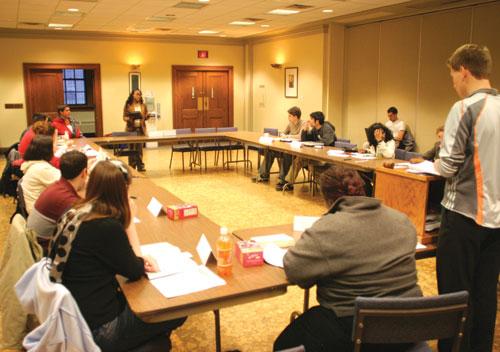University of Wisconsin students might see a spike on their tuition bills next year after the Associated Students of Madison Student Council approved several non-allocable campus organizations' budgets Wednesday night. The council's budget recommendations will be passed along to Chancellor John Wiley and, if approved without any cuts, would result in an increase in segregated fees. The council passed both the University Health Services and Recreational Sports budgets, as well as the Wisconsin Union Building Initiative budget, which narrowly passed by a 7-6-2 vote after an intense debate. The budget will increase segregated fees by $85 per student, as it will cover the entire $3.3 million expense. "I find it amazing that students are footing this entire bill," Finance Committee Chair Sree Atluru said. "This amount of money being increased is very disturbing to me — I find that unfair and absolutely unacceptable." Although segregated fees will cover the remaining cost to fulfill the WUBI budget, according to SSFC Chair Zach Frey, the union has done all that it can to reduce the amount needed to complete their project. "Without going into segregated fees, they took out money from their reserve to pay for a lot of their costs," Frey said. "SSFC [was] really impressed with all the other stuff the union was doing, like raising additional revenue to reduce segregated fees." Yet many members sought to make changes to the budget so segregated fees would not see an increase. However, according to Frey, the budget is "non-allocable," meaning the council can only make recommendations to the chancellor about the amount of segregated fees the union requests. "It is not really our job to add programs or micromanage [the union budget]," Frey said. "Our job is only to advise the chancellor." Along with approving non-allocable budgets, the council also discussed proposed changes to its bylaws. Student Council representative Erika Lopez proposed a change in the bylaws that would encourage council members to work on multiple student issues, as well as take a grassroots initiative in addition to doing committee work. "By changing the bylaws, it will allow Student Council to maintain a higher attendance at meetings and build closer relations between student members here on campus." Lopez said. "It will also bring us closer to a grassroots initiative — we are moving very far away from those grounds." Atluru said she strongly agreed with this change, noting that out of the 33 members on ASM council, only 18 were present during the meeting. "Student Council doesn't do anything, and I think that is embarrassing," Atluru said. "As [Finance Committee] chair, I take what students want into account very seriously, and I think more members should be held accountable to know what students want." A proposal to pay Student Judiciary members $400 each also failed to pass. "I don't see why [Student Judiciary] members should get paid, while ASM council members — like myself — do much more work," Frey said. "Paying $400 to members who only do about three cases a year is not being fair to interns and volunteers." The group Breakin' the Law had its nearly $4,200 budget pass as well, without much debate.







